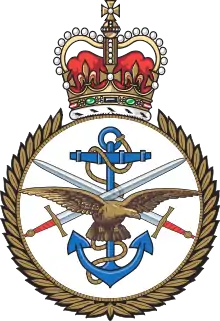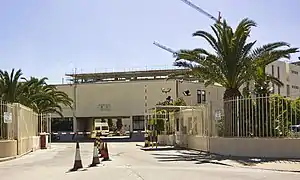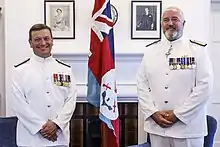British Forces Gibraltar
British Forces Gibraltar is the British Armed Forces stationed in the British overseas territory of Gibraltar. Gibraltar is used primarily as a training area, thanks to its good climate and rocky terrain, and as a stopover for aircraft and ships en route to and from deployments East of Suez or in Africa.
| British Forces Gibraltar | |
|---|---|
 British Forces Tri-Service badge | |
| Active | 1889–current |
| Country | |
| Allegiance | |
| Branch | Strategic Command[1] |
| Part of | Strategic Command. Subordinate to Director of Overseas Bases. |
| Headquarters | Devil's Tower Camp |
| Anniversaries | Battle of Trafalgar |
| Commanders | |
| Commander of British Forces Gibraltar | Commodore Tom Guy |
| Commanding Officer, Royal Gibraltar Regiment | Lieutenant Colonel Matthew Moore |
| Commanding Officer, Gibraltar Squadron | Lieutenant Commander Simon Holden |
| Commanding RAF Gibraltar | Wing Commander Jackson Brown MBE RAF |
History

British Armed Forces in Gibraltar had been predominantly naval-led since the 1890s. In the 1950s discussions about the creation of NATO's Allied Forces Mediterranean led to the Flag Officer Gibraltar being placed in command of NATO forces in the area.[2]
However, many years later, the British Royal Navy captain serving as Head of Sea Section in Operations Division, SHAPE, was to have to deal with the re-absorption of Spain into NATO in the early 1990s. Arranging the NATO-Spain-Gibraltar-UK linkages involved "delicate negotiations," but British plans, to Captain Peter Melson's knowledge "committed no forces to defence of the Strait, while Spain was willing to commit substantial elements of their ORBAT [order of battle, their armed forces]."[3]
The last UK based army battalion, 3rd Battalion Royal Green Jackets, left Gibraltar in 1991 and the Royal Gibraltar Regiment took charge of local defence under the new headquarters British Forces Gibraltar.[4]
HM Dockyard, Gibraltar
HM Dockyard, Gibraltar was active from 1895 to 1984. The dockyard was used extensively by the Royal Navy, docking many of the Navy's most prestigious ships. In the early 1980s a decision by the United Kingdom's Ministry of Defence to cut back the Royal Navy surface fleet meant that the dockyard was no longer financially viable.[5]
In 1984 the dockyard passed into the hands of the UK ship repair and conversion company, A&P Group. A government grant and a prospect of lucrative Royal Fleet Auxiliary refit contracts did not help A&P Group however and they passed the yard into the hands of the Government of Gibraltar.
The current dockyard is still used by the Royal Navy and is referred to as 'His Majesty's Naval Base Gibraltar (HMNB Gibraltar)'.[1]
The base is the permanent home to the Royal Navy's Gibraltar Squadron, equipped with two Cutlass-class patrol vessels and three Pacific 24 rigid inflatable boats.[6] They are supported by two patrol boats and rigid inflatable boats of the Gibraltar Defence Police, as well as diving platforms and harbour work boats. The base is also home to the offshore patrol vessel HMS Trent.[7] Gibraltar regularly hosts other British or allied warships and support vessels.[8]
Permanent units
Though Gibraltar's current garrison is much smaller than it had been before the end of the Cold War, a sizable force still exists, including:[1]
Ministry of Defence/HQ British Forces Gibraltar (145 military personnel as of 2023 plus 528 civilians under contract)[9]
- Armaments Depot, Gibraltar,[1] Defence Equipment and Support
- Kings lines oil fuel depot, Oil and Pipelines Agency
Army
- Royal Gibraltar Regiment (Hybrid), at Devil's Tower Camp (Mixed infantry-focused unit; 235 personnel reported as of 2023)[10]
- Buffadero Training Centre
Navy (28 personnel as of 2023, plus additional personnel assigned to HMS Trent)[11]
- Windmill Hill Signal Station[1]
- His Majesty's Naval Base, Gibraltar[1]
- Gibraltar Squadron, at His Majesty's Naval Base, Gibraltar[1][12][13][14][15]
- River-class offshore patrol vessel: HMS Trent[16] – permanently deployed at Gibraltar since April 2021[17][18]
- Cutlass-class patrol vessels (replaced previous Archer-class boats 2021/22):[19]
- HMS Cutlass (arrived in Gibraltar, November 2021)
- HMS Dagger (arrived in Gibraltar, March 2022)[20]
- x3 Pacific 24 Rigid-hulled inflatable boats
- x1 Sea-class 15m diving support boat[21][22]
- Gibraltar Squadron, at His Majesty's Naval Base, Gibraltar[1][12][13][14][15]
Air Force (16 personnel as of 2023)[23]
- RAF Gibraltar, the Royal Air Force's military aerodrome in Gibraltar, also doubles up as the territory's civilian airport.[24]
Flag officer commanding
Senior Officer, Gibraltar
Post holders included:[25][26]
- Captain Claude E. Buckle: August 1889 – February 1892
- Captain Atwell P.M. Lake: February 1892 – January 1895
- Captain James A.T. Bruce: January 1895 – January 1898
- Captain Charles C. Drury: January 1898 – September 1899
- Captain William H. Pigott: September 1899 – October 1902 (later V.Adm Sir William Harvey Pigott)
Flag Officer, Gibraltar
Post holders included:[25]
- Vice-Admiral Sir William A. Dyke Acland, Bt.: October 1902 – July 1904
- Rear-Admiral Sir Edward Chichester, Bt.: July 1904 – September 1906
- Rear-Admiral Sir James E.C. Goodrich: September 1906 – September 1909
- Vice-Admiral Frederick S. Pelham: September 1909 – October 1912
- Vice-Admiral Frederic E.E.Brock: October 1912 – October 1915
- Rear-Admiral Bernard Currey: October 1915 – July 1917 (and as Senior Naval Officer and in charge of all Naval Establishments, Gibraltar)
- Rear-Admiral Sir Heathcoat S.Grant: July 1917 – July 1919
- Rear-Admiral Sir Reginald Y.Tyrwhitt, Bt.: July 1919 – January 1921
- Rear-Admiral Henry B.Pelly: January 1921 – January 1923 (also Admiral Superintendent, Gibraltar Yard)
- Rear-Admiral Walter M. Ellerton: January 1923 – April 1925
- Rear-Admiral Richard G.A.W.Stapleton-Cotton: April 1925 – April 1927 (also Admiral Superintendent of H.M. Dockyard, Gibraltar)
- Rear-Admiral Cyril S. Townsend: April 1927 – April 1929 (also Admiral Superintendent of H.M. Dockyard, Gibraltar)
- Rear-Admiral Berwick Curtis: April 1929 – April 1931
- Rear-Admiral Thomas N. James: April 1931 – May 1933
- Rear-Admiral Francis M. Austin: May 1933 – May 1935
- Vice-Admiral Sir James M. Pipon: May 1935 – May 1937
- Rear-Admiral Alfred E. Evans: May 1937 – May 1939, as Rear Admiral-in-Charge, and Admiral-Superintendent HM Dockyard Gibraltar[27]
Flag Officer, Gibraltar and North Atlantic
- Rear-Admiral Norman A. Wodehouse: May–November 1939
- Admiral Sir Dudley B. N. North: November 1939 – December 1940
- Vice-Admiral Sir G. Frederick B. Edward-Collins: December 1940 – December 1942
Flag Officer, Gibraltar and Mediterranean Approaches
Post holders included:
- Vice-Admiral Sir Frederick Edward Collins : December 1942 - January 1943
- Admiral Sir Frederick Edward Collins : January 1943 - August 1943
- Vice-Admiral Sir Harold M. Burrough: September 1943 – January 1945[28]
- Vice-Admiral Sir Victor A.C. Crutchley: January 1945 – December 1946[29]
Flag Officer, Gibraltar
Post holders included:[25]
- Vice-Admiral Ernest R. Archer: December 1946 – June 1948
- Vice-Admiral Patrick W.B. Brooking: June 1948 – June 1950
- Vice-Admiral Lord Ashbourne: June 1950 – May 1952
- Rear-Admiral St. John A. Micklethwait: May 1952 – October 1953
- Rear-Admiral Harry P. Currey: October 1953 – May 1956
- Rear-Admiral Roy S. Foster-Brown: May 1956 – February 1959[30]
- Rear-Admiral Philip F. Powlett: February 1959 – March 1962
- Rear-Admiral Erroll N. Sinclair: March 1962 – July 1964
- Rear-Admiral Thomas W. Best: July 1964 – November 1966
- Rear-Admiral Michael F. Fell: November 1966 – April 1968
- Rear-Admiral Ian W. Jamieson: April 1968 – October 1969
- Rear-Admiral A. Rodney B. Sturdee: October 1969 – January 1972
- Rear-Admiral Hubert W.E. Hollins: January 1972 – May 1974
- Rear-Admiral Sefton R. Sandford: May 1974 – September 1976
- Rear-Admiral Michael L. Stacey: September 1976 – January 1979
- Rear-Admiral Gwynedd Pritchard: January 1979 – January 1981
- Rear-Admiral D. John Mackenzie: January 1981 – January 1983
- Rear-Admiral George Vallings: January 1983 – March 1985
- Rear-Admiral Peter G.V. Dingemans: March 1985 – September 1987
- Rear-Admiral the Hon. Nicholas J. Hill-Norton: September 1987 – January 1990
- Rear-Admiral Geoffrey Biggs (January 1990 – April 1992)[31]
Commander British Forces, Gibraltar

Post holders included:[32]
- Rear Admiral Jeremy Sanders (April 1992 – December 1994)
- Major-General Simon Pack (December 1994 – April 1997)
- Commodore Alastair Taylor (April 1997 – June 1999)
- Commodore Andrew Willmett (June 1999 – December 2001)
- Commodore Richard Clapp (December 2001 – May 2004)
- Commodore David White (May 2004 – 8 January 2005)[33]
- Commodore Allan Adair (19 January 2005 – 1 May 2007)[34]
- Commodore Matt Parr (1 May 2007 – February 2009)[35]
- Commodore Adrian Bell (February 2009 – September 2010)[36]
- Commodore Tom Karsten (September 2010 – November 2012)[37]
- Commodore John Clink (November 2012 – August 2014)[38]
- Commodore Ian McGhie (August 2014 – July 2016)[39]
- Commodore Mike Walliker (July 2016 – September 2018)[40]
- Commodore Timothy Henry (September 2018 – July 2020)[41]
- Commodore Steve Dainton (July 2020 – present)[42]
See also
Notes
- "FOI(A) regarding British Forces Gibraltar" (PDF). What do they know?. 5 May 2021. Retrieved 6 May 2021.
- "Memorandum from the Military Representatives Committee" (PDF). NATO. Retrieved 9 January 2016. and "Chronology and Organisation of Allied Command" (PDF). NATO. Retrieved 9 January 2016.
- Peter Melson (2014). "NATO in Transition: Five Years in SHAPE 1989 to 1994". The Naval Review (UK): 161.
- "The British Army in Gibraltar". Ministry of Defence. Retrieved 7 June 2015.
- Horseman, Martin, ed. (March 1982). "RN Dockyard in Gibraltar to close". Armed Forces. Shepperton: Ian Allan. p. 44. ISSN 0142-4696.
- "Gibraltar Squadron". Royal Navy. Retrieved 11 May 2023.
- "Two new vessels for GDP as part of £36m MoD contract". Gibraltar Chronicle. 17 June 2021. Retrieved 14 September 2023.
- Heappey, James (2 May 2023). "Gibraltar: Military Bases – Question for Ministry of Defence (UIN 182428)". UK Parliament. Retrieved 11 May 2023.
- "Some 14,000 British servicemen pass through Gibraltar each year". The Diplomat. 25 April 2023.
- "Some 14,000 British servicemen pass through Gibraltar each year". The Diplomat. 25 April 2023.
- "Some 14,000 British servicemen pass through Gibraltar each year". The Diplomat. 25 April 2023.
- "QHM Gibraltar". GOV.UK. Retrieved 23 April 2021.
- Channon, Max (1 August 2019). "The Royal Navy Gibraltar Squadron officially Rock!". PlymouthLive. Retrieved 13 April 2021.
- "All change at the top for Gibraltar Squadron | Royal Navy". www.royalnavy.mod.uk. Retrieved 13 April 2021.
- "FOI(A) regarding Forces overseas" (PDF). What do they know?. 23 November 2020. Retrieved 22 April 2021.
- "HMS Trent (P224) | Royal Navy". www.royalnavy.mod.uk. Retrieved 1 April 2021.
- HMS TRENT Heads To Gibraltar For LENGTHY DEPLOYMENT 🚢⚓, archived from the original on 13 December 2021, retrieved 31 March 2021
- "Defence review will forge a growing Navy with expanding horizons". www.royalnavy.mod.uk. Retrieved 31 March 2021.
- "BMT completes successfully trials for High-Speed Patrol Craft HMS Cutlass". Navy Recognition.
- "The second new @RNGibSqn patrol boat, HMS Dagger has been delivered to Gibraltar". Twitter. Retrieved 31 March 2022.
- "Sixth and final support boat delivered to Royal Navy diving group". www.royalnavy.mod.uk. Retrieved 25 February 2023.
- "SEA Class Marine Craft". Atlas Elektronik. Retrieved 25 February 2023.
- "Some 14,000 British servicemen pass through Gibraltar each year". The Diplomat. 25 April 2023.
- Ministry of Defence (13 May 2021). "British Forces Gibraltar explained". Voices Of The Armed Forces. Retrieved 14 March 2022.
- Mackie, Colin. "Royal Navy Senior Appointments from 1865". gulabin.com. Colin Mackie. pp. 163–164. March 2018. Retrieved 10 March 2018.
- Harley, Simon; Lovell, Tony. "Gibraltar – The Dreadnought Project". dreadnoughtproject.org. Harley and Lovell, 26 November 2017. Retrieved 10 March 2018.
- Svonavec, Stephen. "Royal Navy Flag Officers, December 1, 1937". Fleet Organization Web Site. Stephen Svonavec. Retrieved 6 July 2014.
- Whitby, Michael (2011). Commanding Canadians: The Second World War Diaries of A.F.C. Layard. Vancouver, Canada: UBC Press. p. 362. ISBN 9780774840378.
- "Naval Commands and Flag Officers (Hansard, 10 April 1946)". Hansard: vol 421 cc1897-9. Retrieved 4 July 2020.
- "Obituary: R. A. Foster-Brown". The Independent. 2 February 1999. Retrieved 9 January 2016.
- page 125
- Mackie. 2018.
- "Body of Gibraltar commander found". BBC News. 9 January 2005. Retrieved 16 August 2014.
- "The Permanent Joint Headquarters". Gov.uk. Archived from the original on 5 May 2007. Retrieved 16 August 2014.
- "Military teams triumph in the Gibraltar Triathlon". News. 14 August 2008. Retrieved 16 August 2014.
- "Gibraltar: British could have fired on Spanish police launch". News Focus. 12 December 2009. Retrieved 16 August 2014.
- "CBF Gibraltar promotion to Rear-Admiral". Gibraltar Chronicle. 4 September 2012. Retrieved 16 August 2014.
- "Commodore John Clink is new CPF". Gibraltar Chronicle. 17 October 2012. Archived from the original on 19 August 2014. Retrieved 16 August 2014.
- "New CBF for Gibraltar as Commodore Clink Accepts Rear Admiral Promotion". Your Gibraltar. 3 June 2014. Retrieved 16 August 2014.
- GBC News (13 July 2016), CBF Retires, and Stays in Gibraltar, archived from the original on 13 December 2021, retrieved 14 July 2016
- GBC News (31 August 2018), CFormer Gibraltar Squadron commander, Commodore Tim Henry, to take over as CBF on Tuesday, retrieved 2 September 2018
- GBC NEWS (1 July 2020), Gibraltar's new Commander British Forces will be Commodore Steve Dainton
.svg.png.webp)